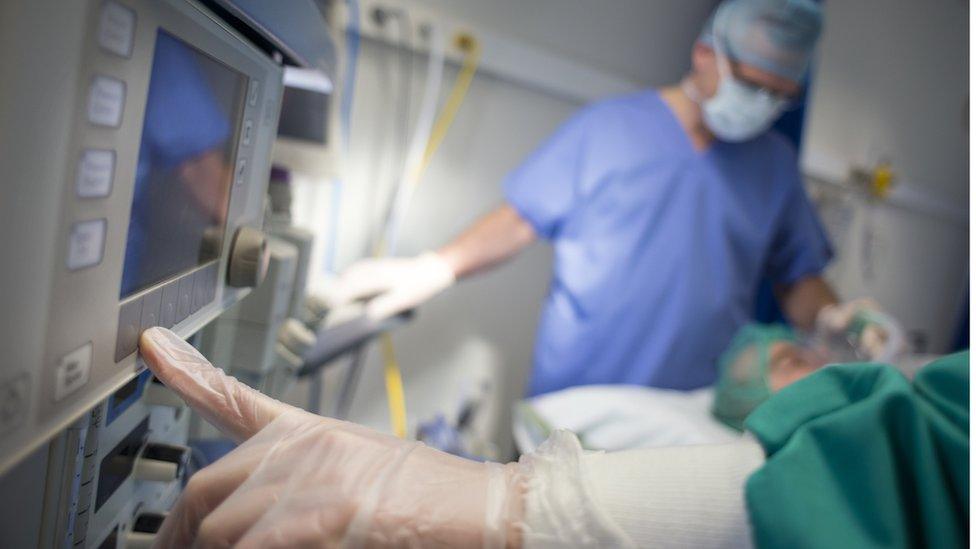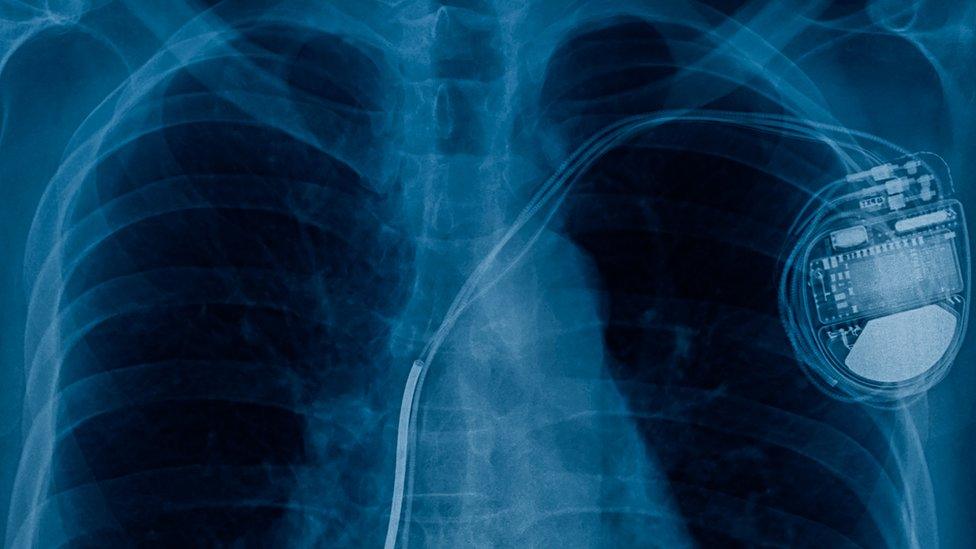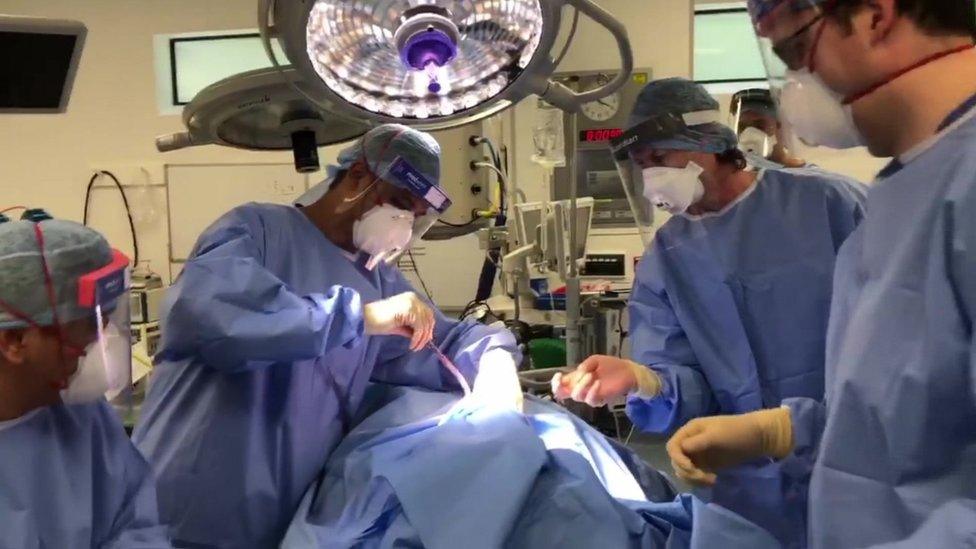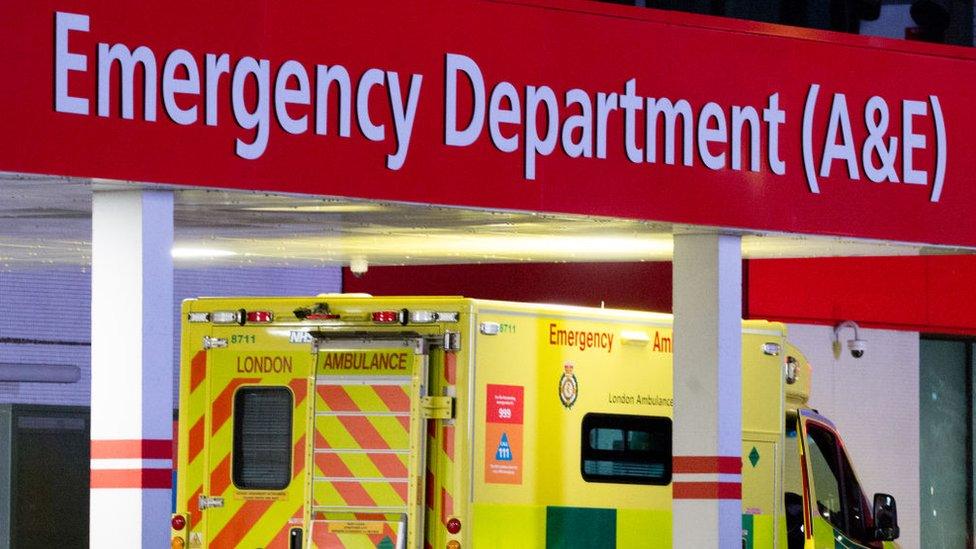'Tens of thousands' of heart procedures delayed by pandemic
- Published
- comments

An estimated 28,000 procedures have been delayed in England
The postponement of tens of thousands of hospital procedures is putting the lives of people with long-term heart conditions at risk, according to the British Heart Foundation.
The coronavirus pandemic has created a backlog which would only get larger as patients waited for care, it said.
People with heart disease are at increased risk of serious illness with Covid-19, and some are shielding.
In the last two weeks, cardiology services have started again in England.
The BHF estimates that 28,000 procedures have been delayed in England since the outbreak of coronavirus in the UK.
These are planned hospital procedures, including the implanting of pacemakers or stents, widening blocked arteries to the heart, and tests to diagnose heart problems.
People now waiting for new appointments would already have been waiting for treatment when the lockdown started, the charity said, as it urged the NHS to support people with heart conditions "in a safe way".
'I'm just in limbo'

Sarah Miles is shielding because of her high risk of being very ill with Covid-19
Sarah Miles, 45, a former nurse from Somerset, has been ill for some time with heart failure, after a heart attack and cardiac arrest when she was 38.
She has had several recent appointments cancelled, including a procedure to correct abnormal heart rhythms she had already waited six months for, and an assessment for a new heart.
"It makes you feel anxious and alone," she says, having been shielding from the virus because of her high risk of complications.
Yet the last thing she wants to do is complain.
"I understand the practicalities but it's worrying me that there is no plan - no-one is keeping me informed or anything.
"Even accessing medication online is more difficult because doctors need extra time to arrange it."
A nurse would normally come to her house, where she is sleeping in the front room, to carry out blood tests - but that hasn't happened.
"I haven't had any follow-up after being in hospital in February either," she says.
She is no longer able to walk very far and the hope of a heart transplant keeps her going, but that's likely to be a long way off.
"I'm just in limbo. It's the not knowing that's the worst."
The NHS scaled back services in many areas and redeployed staff in order to stop the health service from being overwhelmed by patients with Covid-19.
This led to drops in cancer referrals, routine operations and visits to A&E - and there were concerns that seriously ill people were being put off seeking treatment.
'Permanent long-term complications'
"People with heart and circulatory diseases are already at increased risk of dying from Covid-19, and their lives should not be put at even greater risk by missing out on treatment for their condition," said Dr Sonya Babu-Narayan, associate medical director at the British Heart Foundation.
"If hospital investigations and procedures are delayed too long, it can result in preventable permanent long-term complications, such as heart failure."

The implanting of pacemakers is one of the procedures postponed during the epidemic
A survey of 1,409 adults with heart and circulatory conditions carried out by BHF with YouGov found that during the crisis, a third had struggled to get the medicines they needed and about 40% had had a planned test or procedure postponed or cancelled.
Some of the most urgent heart procedures have taken place during the epidemic.
But although cardiology services have started again, it is not yet clear how long patients will have to wait to for rescheduled appointments.
An NHS England spokesman said: "Now we are through the first peak of the virus, the NHS is safely bringing back other services, as clearly many people will have worried about seeking help during the outbreak."
The number of people coming to A&E for cardiac conditions is "back to the levels we would normally expect", he said.
NHS England said it was also "significantly increasing rehab care for everyone suffering after-effects of the virus".
- Published1 June 2020

- Published20 May 2020

- Published13 April 2020

- Published14 May 2020
